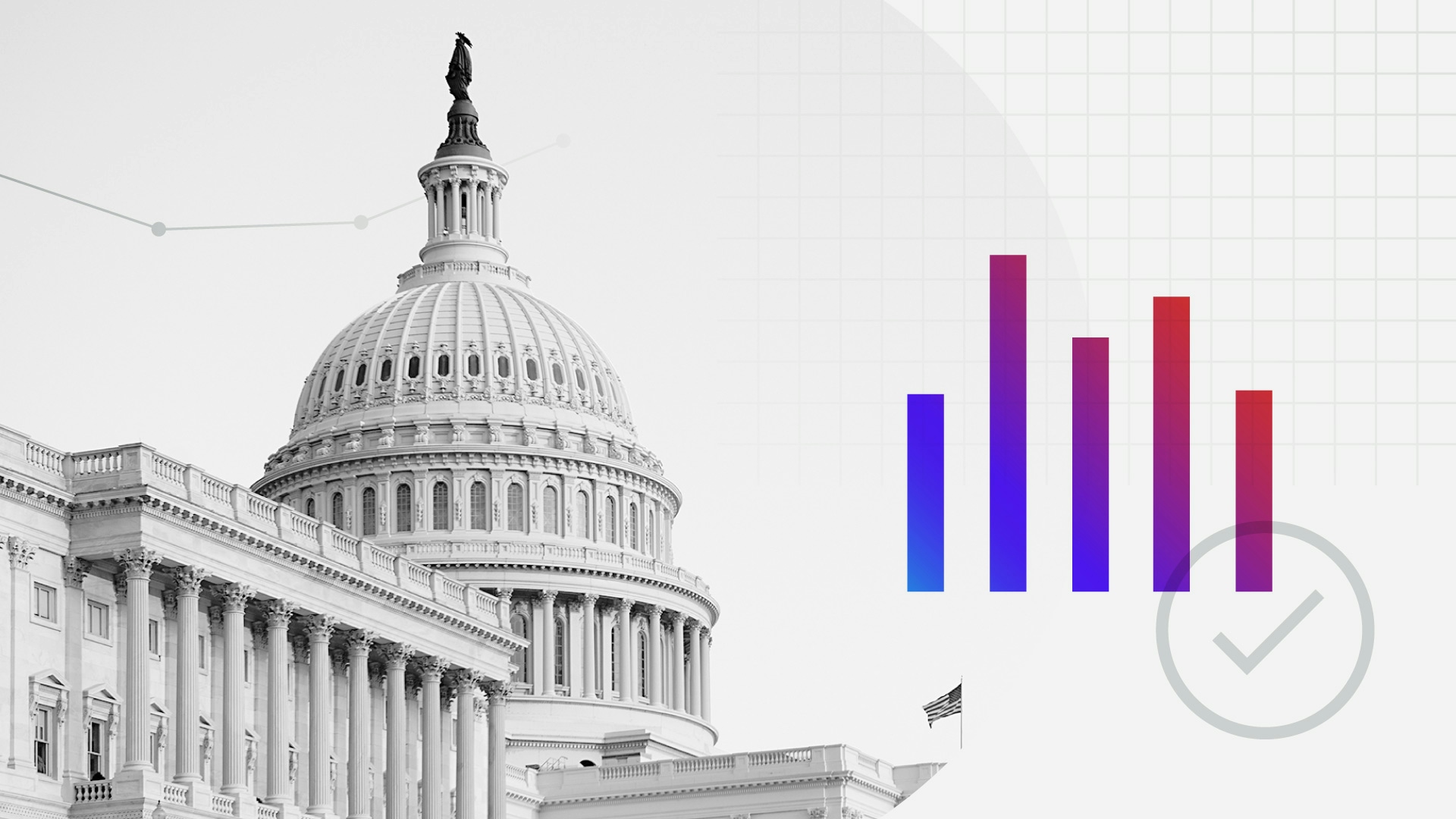What U.S. Voters Think of Renewing a Key Government Surveillance Tool

Key Takeaways
A 55% majority of U.S. voters favor renewing Section 702 of the Foreign Intelligence Surveillance Act before it expires at the end of the year.
The debate hearkens back to the age-old tension between privacy and security. Younger voters tend to prioritize privacy, while older voters generally value security.
Controversies around surveillance abuses have stoked mounting opposition in Congress, highlighting the need for supporters to justify the law’s importance to new generations of American voters.
A savvy approach that amplifies the right voices, and not just the right information, will be most effective in our highly polarized information environment.
Sign up to get our analysis and data on how business, politics and economics intersect around the world.
Renewing Section 702 of FISA has hit political roadblocks
The bid to renew a key foreign intelligence tool by the end of the year is facing opposition from diverse corners of the political arena. Top officials say that a failure by Congress to renew it would be “one of the greatest intelligence failures of our time,” but parties as varied as the American Civil Liberties Union and some pro-Trump Republicans oppose its reauthorization absent sweeping changes.
Congress has needed to renew Section 702 of the Foreign Intelligence Surveillance Act periodically since it first became law in 2008. But in recent years, the margins of legislative approval have become thinner, with the most recent extension in 2018 seeing significant opposition in both parties. As this piece went to publication, lawmakers had reportedly reached a tentative agreement to include an extension of FISA through April in the annual National Defense Authorization Act, though the text of that deal hasn’t been finalized and the measure would need to pass both the House and Senate.
Informed voters are more likely to support renewing the surveillance powers
Most Americans are not intimately acquainted with Section 702. In our Oct. 10-12 survey, roughly a third of U.S. voters (34%) said they had recently seen, read or heard at least “some” about the surveillance tool, with only 11% saying they had heard “a lot” about it. But after providing a brief explanation of the program, a majority of voters said they supported its renewal. This is in line with public opinion the last time Section 702 was up for extension in late 2017, though Republicans are now less likely than Democrats to support its reauthorization. Voters who have already heard at least “some” about it (who we call “informed voters”) are more likely to express approval.
Informed Voters Are More Likely to Favor FISA Section 702 Renewal
Tug of war between security and privacy
Born during the U.S. “war on terror” sparked by 9/11, Section 702 of FISA allows U.S. intelligence agencies to gather the communications of foreign nationals overseas without a warrant. Although collection on U.S. citizens is illegal, data on Americans is sometimes gathered “incidentally” when they are communicating with surveilled foreigners.
Specific demographics at scale: Surveying thousands of consumers around the world every day powers our ability to examine and analyze perceptions and habits of more specific demographics at scale, like those featured here.
Why it matters: Leaders need a better understanding of their audiences when making key decisions. Our comprehensive approach to understanding audience profiles complements the “who” of demographics and the “what” of behavioral data with critical insights and analysis on the “why.”
On its face, the controversy centers on the age-old debate over the proper balance between security and privacy. In general, voters tend to prefer security to privacy when presented with a binary choice. Gen Z voters, however, are more likely to favor privacy, perhaps due to a lifetime spent under commercial surveillance. Millennials are evenly split, while older generations generally choose security. Democrats, for their part, tend to prefer security to privacy at higher rates than either Republicans or independent voters.
Gen Z Voters Place a Premium on Privacy, While Older Voters Prioritize Security
Voters know more about abuses of Section 702 than about the tool itself
Fears of government overreach are not totally baseless. In some cases, U.S. officials have abused the government’s incidental data collection on Americans by searching the Section 702 database for U.S. citizens in connection with the Jan. 6 insurrection, participants in Black Lives Matter protests and even on elected officials. And while it was not technically carried out under Section 702, the secret court that operates under FISA issued warrants for the surveillance of former President Donald Trump adviser Carter Page in connection with Russian interference in the 2016 U.S. elections. Far more voters reported hearing about these controversies than about the program itself. Voters who consume conservative news sources at least weekly are particularly likely to have heard about such abuses.
Controversies Around Section 702 Break Through to Voters
Proven success in preventing attacks on the United States is key, but it matters who is providing the information
Those voters who support renewal generally do so because the program has purportedly helped catch terrorists and keep America safe. Those who oppose reauthorization tend to say that Section 702 allows for too much government overreach and cite how it has been used to search for data on U.S. citizens. This supports the theory that, in the minds of U.S. voters, the main issue is a tradeoff between safety and privacy. As such, those seeking its renewal must both clearly justify how it enhances U.S. security and lay out how it mitigates the privacy risks.
Opposition to Section 702 Renewal Stems From Privacy Fears, Support Comes From Security Successes
Voters from both parties trust the courts, but their role is narrow
In our current political environment, it matters who is providing information. Republicans predictably are most likely to value the opinions of former President Donald Trump — who ultimately supported renewing Section 702 in 2018 — and of congressional Republicans, while Democrats tend to value those of the Biden administration, congressional Democrats and to a lesser extent the ACLU. Courts are the only institution on the list that voters from both parties generally agree have an important voice on the issue.
Courts Skirt Polarization on Section 702, While Other Figures Have Credibility Among One Party or the Other
But Congress cannot fully outsource to the courts the job of convincing voters. The judiciary has issued little guidance in this area, and most Fourth Amendment cases have dealt narrowly with specific methods, including the Supreme Court’s most recent ruling on FISA. Nevertheless, lawmakers can and should tout court decisions on the constitutionality of surveillance programs when conducting public relations on Section 702.
Amplify the right voices, not just the right information
The reported tentative agreement to tie FISA and the NDAA is a positive sign, but it would only kick the proverbial can down the road through April of next year. Given ever narrower margins for renewing FISA as the years pass, it seems clear that highlighting the importance of these tools for national security will not perpetually be sufficient to convince voters – especially younger voters – that the privacy tradeoffs are worth it. In a political environment marked by low trust in institutions, a savvy approach that amplifies the right voices, and not just the right information, will be most effective.
Sonnet Frisbie is the deputy head of political intelligence and leads Morning Consult’s geopolitical risk offering for Europe, the Middle East and Africa. Prior to joining Morning Consult, Sonnet spent over a decade at the U.S. State Department specializing in issues at the intersection of economics, commerce and political risk in Iraq, Central Europe and sub-Saharan Africa. She holds an MPP from the University of Chicago.
Follow her on Twitter @sonnetfrisbie. Interested in connecting with Sonnet to discuss her analysis or for a media engagement or speaking opportunity? Email [email protected].

